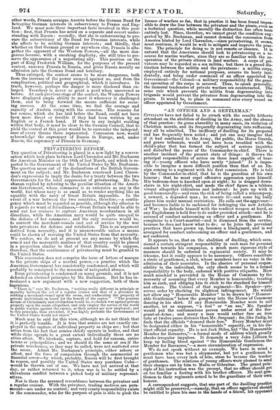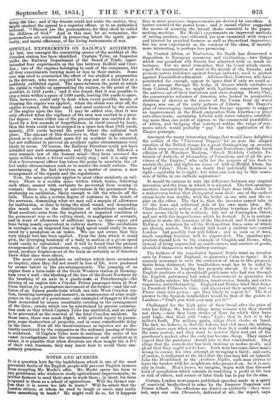"AN OFFICER AND I GENTLEMAN."
CrversAies have not failed to be struck with the results hitherto attendant on the abolition of duelling in the Army, and the abuses of that practice:: its gross absurdity in many oases, its violation of Christian morals, and its frequently degenerating into ruffianism, may all be admitted. The inefficacy of duelling for its proposed end has frequently been noted ; and yet one may imagine that if it had continued in the Army, the publio, the Horse Guards, and grave tribunals, would not have been troubled with the child's-play that has formed the subject of serious inquiries and disturbed the peace of the Commander-in-chief. There is another incident of the present state of things: it throws the principal responsibility of action on those least capable of bear- ing it—young officers who have newly "joined." It is impos- sible to imagine a more difficult position than that of an En- sign coming to a regiment with his first commission. Be is told by the Commander-in-chief, that he is the guardian of his own honour that he must repel offensive aggression upon himself. His bedroom-door is knocked open at night ; he is dragged down- stairs in his night-shirt, and made the chief figure in a tableau vivant altogether ridiculous and indecent : he puts up with it good-humouredly—and runs the risk of being called a nincompoop, a coward, a degraded man ; he resents it—and some big bully places him under manual restriction. He calls out theaggressor- and becomes liable to be cashiered for infringing the new Articles of War ; he defends himself with the readiest weapon at hand, as any Englishman is held free to do under provoked attack—and he is accused of conduct unbecoming an officer and a gentleman. He complains to a Court-martial—and is dismissed from the service, because he does not know what to do; or he joins the prevalent practices that have grown up, becomes a blackguard, and is not arraigned for conduct unbecoming an officer and a gentleman, and not cashiered.
It appears to us, that on the abolition, of duelling, which occa- sioned a certain stringent responsibility in each man for personal conduct towards his companion, a much more rigorous style of manners should be enforced in regimental society. It may be irksome, but it really appears to be necessary. Officers constitute a circle of gentlemen, a club, whose members have no voice in the admission of their associates. In the absence of personal respon- sibility to the individual, the only cheek seems to be a formal responsibility to the body, enforced with positive etiquette. How much mischief is prevented in the House of Commons by the necessity of assuming that every Member is honourable; treating him as such, and obliging him to stick to the standard for himself and others. The Colonel of that regiment—Mr. Speaker—pre- serves order by checking its slightest infringement. He would not allow any 4 Honourable Member" to be drawn by "Honour- able Gentlemen" below the gangway into the House of Commons dancing in his shirt. If any Honourable Member were to call another, let us suppose, "a fool" or "an ass," Mr. Speaker would put the contumacious person under arrest of the Ser- geant-at-Arms; and many a man would rather face an iron tube at twelve paces distance than Mr. Sergeant ; for, like Zadig, he finds that the officials "demand their fees.' Every Member must be designated either in his "honourable" capacity, or in his dis- tinct official capacity. He is not jack Stiles, hilt "the Honourable Member for Bareacres "—a formal mode of adcrress which greatly checks irregular impulses. It demands a very John Lilburn to keep up boiling blood against "the Honourable G-entleman.the Member for Bareaores,"—a mere circumlocution of expression.
We do not speak without an example. We have in mind a gentleman who was but a shipmaster, but yet a gentleman he must have been every inch of him, since he became the teacher of gentlemen. The relations of young officers weie pleased to send their charges out by him to Malta or Gibraltar. The grand prin.- ciple of his instruction was the precept, that no officer should get on too familiar a footing with his brother officers. Resent gen- tlemen to their regiments armed to be the guardians of their oVen honour. - A correspondent suggests, that one part of the duelling_praottoe might still be preserved,—namely' that an officer aggrieved shoald be entitled to place his ease in the hands of a friend, hie opponent doing thb like ; and if the friends could not settle the matter, they might cenduct the appeal to a superior officer, or to an authorized tribunal. " Blessed are the peacemakers, for they shall be called the children of God." And 111 this case, let us remember, the peacemakers are concerned in preserving intact the spirit, gene- rosity, and raoral efficiency, of the living instruments of war.



























 Previous page
Previous page